#PESCOGATE Remember the campaign I organised in 2017? #Military #UK #EU #PESCO #BorderSecurity #PermanentStructuredCoOperation #SandhurstTreaty #TheyWorkForYou 🙃 #Epetitions #Corbyn #MarrakeshCompact
- Caroline Stephens

- Aug 7, 2025
- 24 min read
Updated: Aug 18, 2025
Why is this article important?
Following a UK-wide referendum on 23 June 2016, in which 51.89 per cent voted in favour of leaving the EU and 48.11 per cent voted to remain a member state, David Cameron resigned as Prime Minister.
What were the main reasons for the majorityof UK people voting to leave?
From my work at the 'grassroots', as the Brexit Campaign Manager, the control of our borders alongside control of our legislation were the most important aspects at that time.
This article focuses on 'our border control' since the vote which is seemingly lacking and the signing of treaties since 23 June 2016 which blatantly 'smacks' of 'business as usual'.
You will see that whilst you read this substantial collation of evidence that seemingly people have been sleeping. Those who were trusted to monitor progress failed miserably.
The military's role
According to AI, the following is an Overview of the 'Military's' role (though of course AI responses can at times be very flawed).
In a democracy, the military's role is multifaceted, primarily focused on defending the nation from external threats while also supporting domestic stability and disaster relief. Key aspects include upholding the constitution, respecting civilian control, and maintaining neutrality in political affairs.
Here's a more detailed look:
A. National Defense: The military's core function is to protect the country's sovereignty and territorial integrity. This includes deterring aggression, responding to threats, and participating in collective defense alliances.
B. Support for Civilian Authority: The military operates under the direction of the elected government, ensuring its actions align with democratic principles. This includes assisting in maintaining public order, providing support during emergencies, and participating in disaster relief efforts.
C. Maintaining Neutrality: A crucial aspect of military professionalism in a democracy is its commitment to political neutrality. The military should not be involved in political parties or factions and should serve the elected government impartially.
D. Promoting Democracy: In some contexts, the military may play a role in supporting the transition to and consolidation of democracy, particularly in countries with a history of military rule. This may involve assisting with security sector reforms or contributing to the rule of law.
E. International Cooperation: Modern militaries often engage in international peacekeeping operations, humanitarian assistance, and disaster response, contributing to global security and stability.
F. Ethical Considerations: Military operations must adhere to international humanitarian law and human rights standards, particularly in conflict zones. Accountability for military actions is essential to ensure transparency and prevent abuses.
In essence, the military in a democracy is a professional, apolitical force that serves the nation under the direction of its democratically elected government. Its role is defined by its commitment to national defense, support for civilian authority, and upholding democratic values.
Let's just take two aspects from the list - serves the nation under the direction of its democratically elected government and responding to threats.😃 At first glance, serving the nation should surely mean that the government of the day listens to the people as a constituency MP who then in turn asks searching questions in Parliament and potentially debating epetitions that generate sufficient interest? Would you think that that is a fair assumption after all the taxpayers fund the MPs salaries?
Military Awareness Campaign - PESCO
Timeline - October 2017
Definition of PESCO
In October 2017 I saw a tweet which suggested that UK was going to join the 'EU Army' (PESCO - Permanent Structured Cooperation) so I launched a Military Awareness Campaign.
What is PESCO? SECURITY & DEFENCE

CAMPAIGN FLYERS
Do you recall seeing our flyers?
No?
Here they are


As you can see, at the bottom of one flyer there was a link to an epetition* urging people to sign and share since MPs SERVE THE PEOPLE? Thus began an extensive UK Military Awareness Campaign called PESCOGATE which COVERED THE WHOLE OF GREAT BRITAIN.
*MORE EPETITION INFORMATION TO FOLLOW.
Another flyer
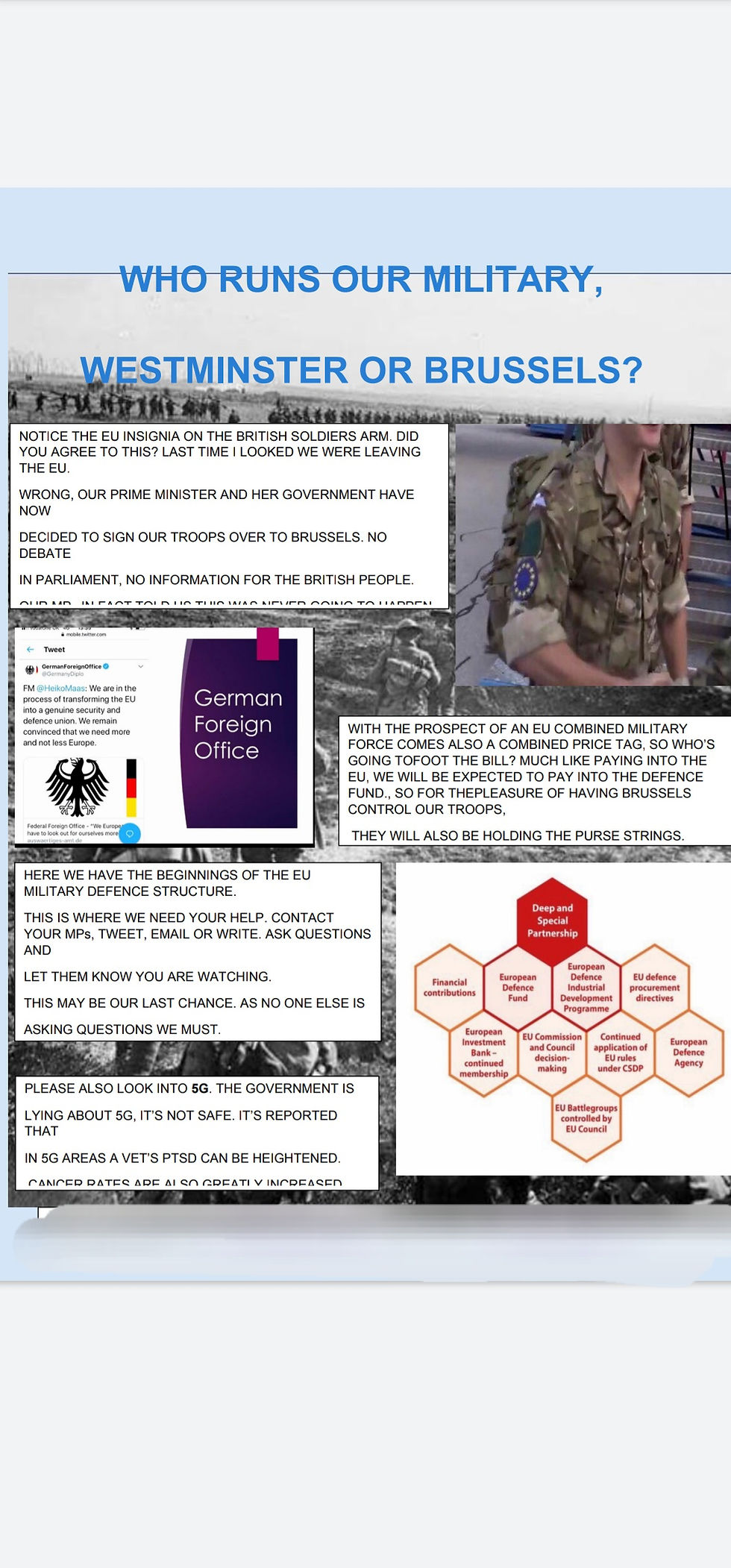
What were our elected representatives and military thinking of? What role did the Royal Family play in all that was unravelling during the latter part of 2017? After all, on enlistment, the Army and Air Force Acts require members of the Army, Royal Air Force and Royal Marines to take an oath of allegiance to the Monarchy as Head of the Armed Forces.
The two of us prepared a template letter or two to be immediately issued to MPs who SERVE OUR NATION and a group of willing constituents were formed from around GREAT BRITAIN who were willing to CORRESPOND with their ELECTED REPRESENTATIVE!
CORRESPONDENCE (small sample)
A TEMPLATE LETTER sent to ESSEX



TOBIAS ELLWOOD

November 2017
A similar email was sent to Jeremy Corbyn in ISLINGTON:
⬇️⬇️⬇️⬇️⬇️⬇️⬇️⬇️⬇️⬇️⬇️⬇️⬇️



And to many, many other MPs all around the United Kingdom including one to Andrew Percy who represented GOOLE.
RESPONSES
MPs' responded with many similarly worded to the following examples:
Here's the response from ALDERSHOT
(AI Overview Of ALDERSHOT
Aldershot, often called the "Home of the British Army," is a major garrison town with a long-standing military presence. Aldershot Garrison is a significant base for the British Army, hosting around 70 military units and organizations, including the headquarters of the Army's Regional Command and Home Command, as well as the Army Special Operations Brigade)

THE FOLLOWING RESPONSE FROM SCARBOROUGH and WHITBY

Response from GRAVESHAM
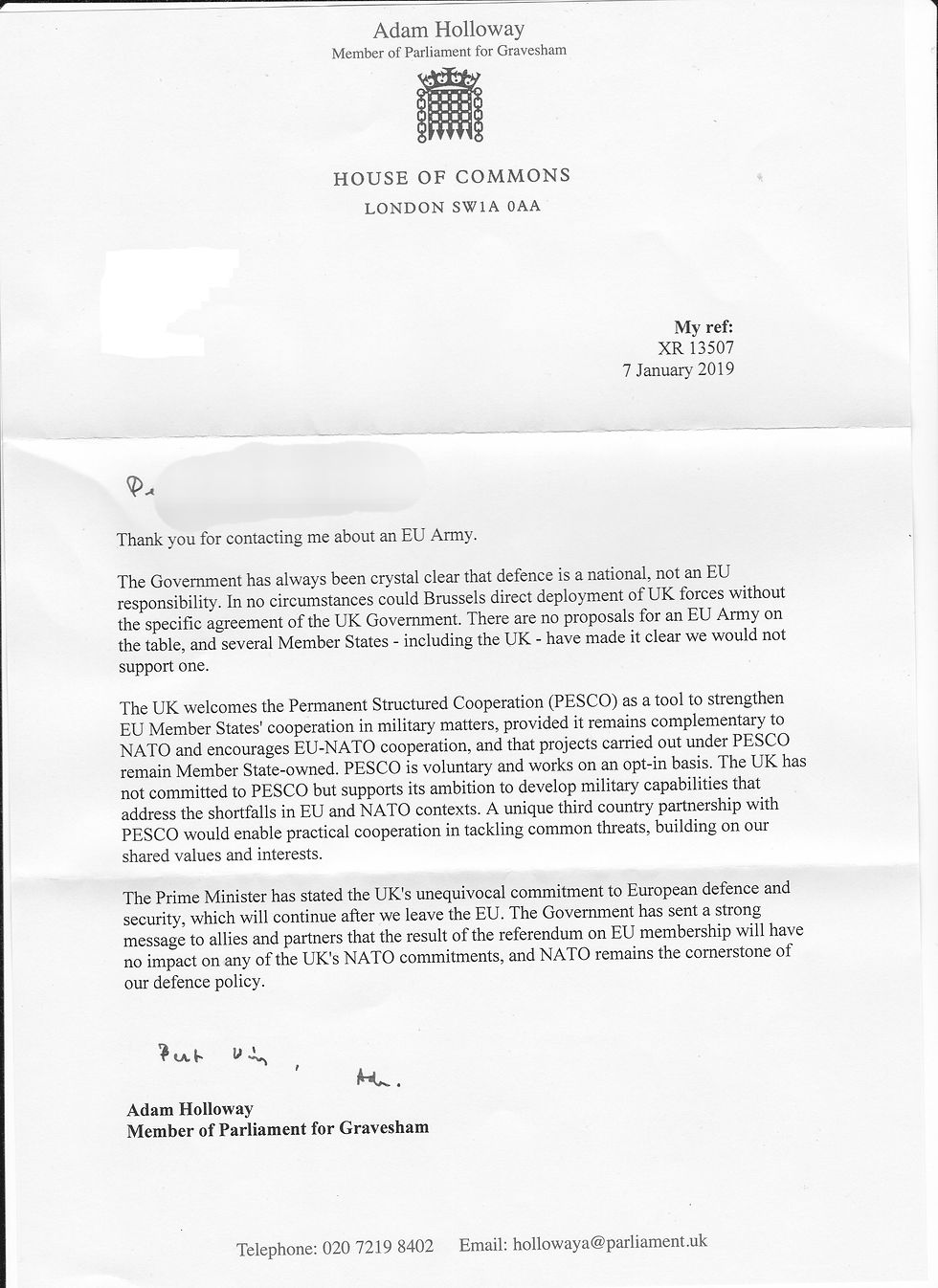
Response from REIGATE
⬇️⬇️⬇️⬇️⬇️⬇️⬇️⬇️⬇️⬇️⬇️⬇️⤴️

TORFAEN

Did your MP respond to your letter or email? 🙄🙄
Here's JEREMY HUNT

And BERNARD JENKINS

MARK PAWSEY

MARK LANCASTER

RICHARD DRAX

And let's look at the response from Lord Howe in December 2017. At the time he was the Minister for the State of Defence and a Conservative in the House of Lords.


Response

TWITTER INFORMATION DISTRIBUTED BY A NON GOVERNMENTAL ORGANIZATION (NGO):
⬇️⬇️⬇️⬇️⬇️⬇️⬇️⬇️⬇️⬇️⬇️⬇️⬇️⬇️
Here we are on Twitter in October 2017 reading a thread produced by an NGO same month as the initial letters/ emails were being issued to MPs.









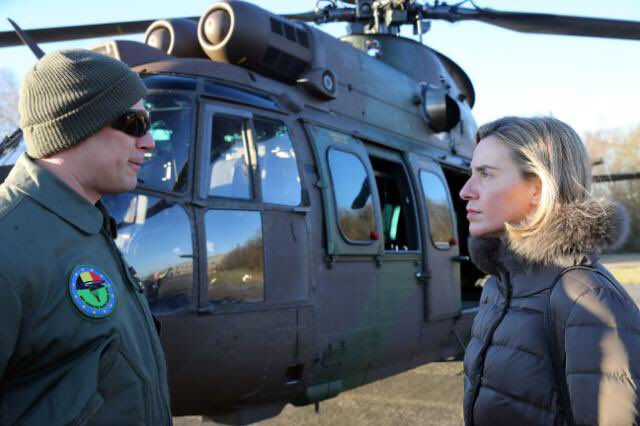




…pillars that support PESCO: EU Defence Fund, EDRP, EDA, EDIDP and a commitment to joint assets and decisions. 16
Although PESCO is outlined in Lisbon Treaty (and protocols), the specific architecture has been kept secret by EU Commission and Council 17/
UK ministers + diplomats can't disclose details of next week's PESCO meeting, not even to UK MPs left in the dark. 18

Without any vote by MPs, the UK is heading towards a permanent integrated military arrangement with the EU.
The opposite of UK autonomy. 19
NATIONAL VETO POWERS
25/26 October 2017
All this was happening simultaneously with what was happening in the EU regarding national veto powers of the EU member states with an explanationon this just below*. Please remember that the UK had not 'left' the EU at this stage and it could be said that maybe we have not really left at all but that discussion is for another day. Let me just remind the leader that when Great Britain joined the EEC now the EU on 1st January 1973, Australia joined with us but the Australian people were, I believe, not made aware of this minor detail. No worries, we have a democratically-elected government, Hobson's Choice if you will. 😉 Do any Australian politicians on the world stage today (actors you see) ever discuss this topic?
*
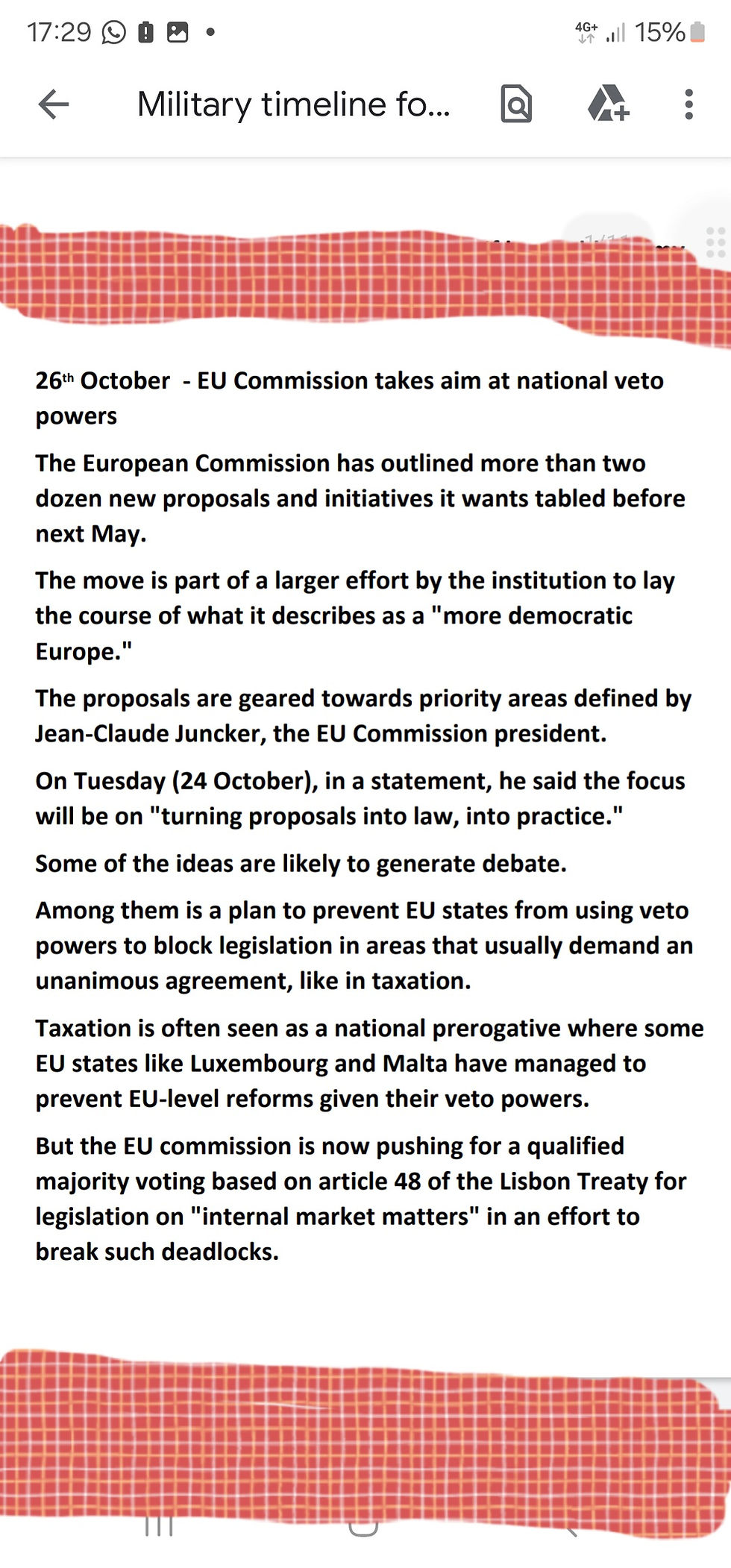
Here is the screenshot proof dated 25th October 2017 regarding the EU taking aim at national veto powers.
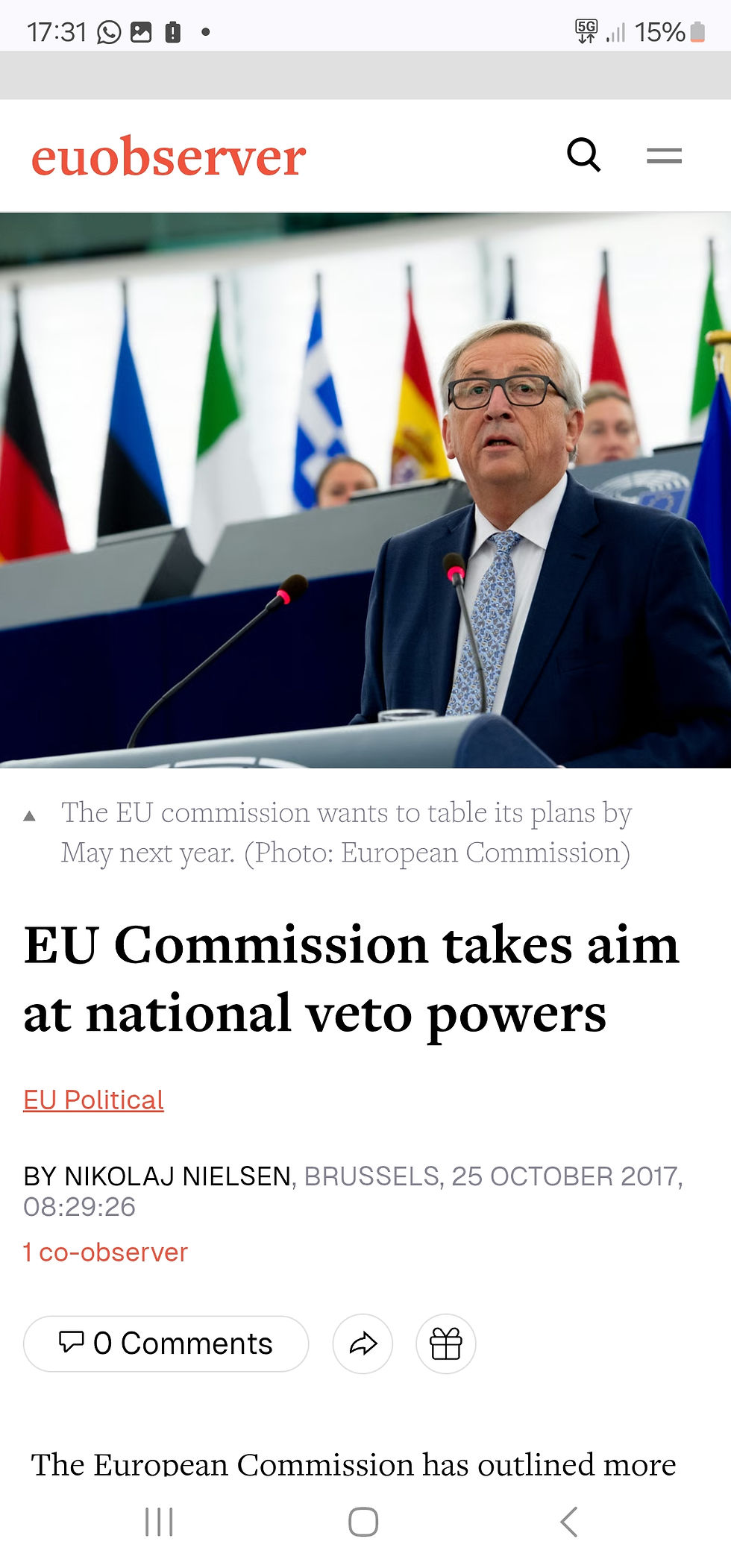
5. FRANS ARTICLE - 12 NOVEMBER 2017
Frans Boogaard wrote an article which appeared in the mid-market Rotterdam newspaper Algemeen Dagblad on 12th November, 2017 as follows:
Fear of loss of national autonomy, of the hollowing-out of NATO or of annoyed reactions from the United States held the project up for decades.
A European Defence Fund and a [European Defence] Industrial Development Fund are in the offing. By shuffling allocations around, Brussels has already made the first €500 million available for 2019 and 2020.
There will, however, be some changes for [defence] industry. The [Dutch] defence market, which is currently 80 per cent domestic, is going be broken open. Brussels intends to foster Europe-wide procurement by using a fund that will soon amount to €5 billion. Before long, [defence] companies, just like troops, are going to have to work together a great deal more. In fact, Dutch troops already very much are: with Belgium (naval and air forces) and Germany (land forces). Soon, all member states will have units which are ‘interoperable’ and which can be used for either NATO, EU, UN or other operations.
On 11th December, 2017, 25 of the 28 EU Member States including Ireland officially joined PESCO with another signing ceremony. Denmark has an opt-out. Unnamed sources have revealed that the UK is being included as a third party member and as such, a third party member is similar to Norway for EU purposes, akin to having colonial status in that it is part of the club but doesn't set the rules and pays some of the dues. Essentially, Britain will be locked in. Britain is already making up some of the shortfalls of other EU countries to the EU Defence Budget. Unlike the other EU countries we continue to pay 2% to NATO unlike the other countries.
I will be revisiting PESCO at a later date but first I need to make people aware of The Sandhurst Treaty 18 January 2018 and Marrakesh Compact on 10 /11 December 2018 'whilst we were still a member of the EU'.
s appening until two days before the official 'launch' meet
🇫🇷 🇫🇷 🇫🇷 🇫🇷 🇫🇷 🇫🇷 🇫🇷 🇫🇷 🇫🇷 🇫🇷 🇫🇷 🇫🇷 6. SANDHURST TREATY - SIGNED AT SANDHURST - BETWEEN FRANCE & GREAT BRITAIN - 18th JANUARY, 2018
Macron said 'This treaty will allow us to drastically reduce waiting time for ALL of those who want to cross the Channel from 6 months to 30 days'.

Best of friends🧡
Incidentally, I asked if Macron ever served in the military?
Apparently Macron did not perform national service because he was pursuing his graduate studies. Born in December 1977, he belonged to the last cohort for whom military service was mandatory.
Right onto the SANDHURST TREATY
What is in Sandhurst? What makes it so special?
⬇️⬇️⬇️⬇️⬇️⬇️⬇️⬇️⬇️⬇️⬇️⬇️

'Sandhurst Treaty': Britain and France agree new deal on border security
Prime Minister Theresa May and French President Emmanuel Macron agreed a new border security deal on Thursday, through which the UK will pay more to France to stop migrants trying to reach British shores.
May also confirmed the loan of the Bayeux Tapestry from France, a historic work depicting the Norman conquest of
England which she said would come to Britain in 2022 for the first time in over 900 years.
The two leaders meeting for wide-ranging talks at the Sandhurst military academy near London, agreed that the
UK will pay an extra £44.5 million (50 million euros, $62 million) for fencing, CCTV and detection technology in Calais
and other Channel ports.
"The further investment we have agreed today will make the UK's borders even more secure," May said during a joint
press conference with Macron.
The 35th UK-France summit came as Britain tries to strengthen bilateral ties before leaving the European Union
in March 2019.
May said she was "honoured" by the loan of the Bayeux Tapestry and Macron said he hoped it would open "a new
chapter" for cultural and scientific co-operation.
"We are somehow making a new tapestry together," Macron said, rejecting any suggestion that it was intended to remind Britain of a victorious France.
The loan has been met with opposition by French experts who have warned about the delicate state of the 70-metre
(230-foot) long embroidery. the tapestry, which shows how the English King Harold being killed by an arrow in the eye at the Battle of Hastings in 1066, is believed to have been created within years of the battle.
Financial services warning
The UK-France summit came as Britain tries to strengthen bilateral ties before leaving the European Union in March 2019.
The French flag was raised over the military base and the French national anthem played out for the arrival of May
and Macron, who were greeted by a guard honour and a flypast of two planes.
They earlier visited the Michelin-star Royal Oak pub in May's Maidenhead constituency, where they had a
"convivial" lunch together according to a British source.
While Brexit was not scheduled for formal discussion, Macron said Britain's decision to leave the European Union
would lead to some "short-term uncertainties". Macron also said that Britain could have "no differentiated
access to financial services" if it decides to leave the European single market.
Otherwise, Britain would have to pay into the EU budget.
"There shall be no hypocrisy in this respect... otherwise we would destroy the single market," he said.
The French president stressed that the new border agreement was a bilateral accord, separate from any EU
divorce deal, aimed at managing the sensitive subject of immigration as hundreds of people continue to camp out in Calais.
Helicopters to Africa
The British prime minister also committed to sending Royal Air Force (RAF) helicopters to a key French counter- terrorism operation in Mali.
Mali is a vast, landlocked country in West Africa with a semi-arid climate. It is a low income country with an undiversified economy that is vulnerable to raw material price fluctuations. 74.9 % of its exports are pearls, precious stones, metals, coins. It shares a boundary with Algeria.
The deployment of three RAF Chinook helicopters to provide logistic support to French troops tackling jihadis
across Africa's Sahel region is part of broader counter-terrorism and military efforts there by the UN, the EU and
the African Union.
It is seen as particularly significant as France is lacking in such capabilities and Britain's commitment could mark the
start of a longer-term deployment in the region.
"Since the last UK-France summit we have seen appalling and cowardly terrorist attacks in both our countries, in
which British and French citizens have died side-by-side," May said.
France in turn has agreed to commit troops to the British-led NATO battlegroup in Estonia in 2019.
🇫🇷 🇫🇷 🇫🇷 🇫🇷 🇫🇷 🇫🇷 🇫🇷 🇫🇷 🇫🇷 🇫🇷 🇫🇷 🇫🇷

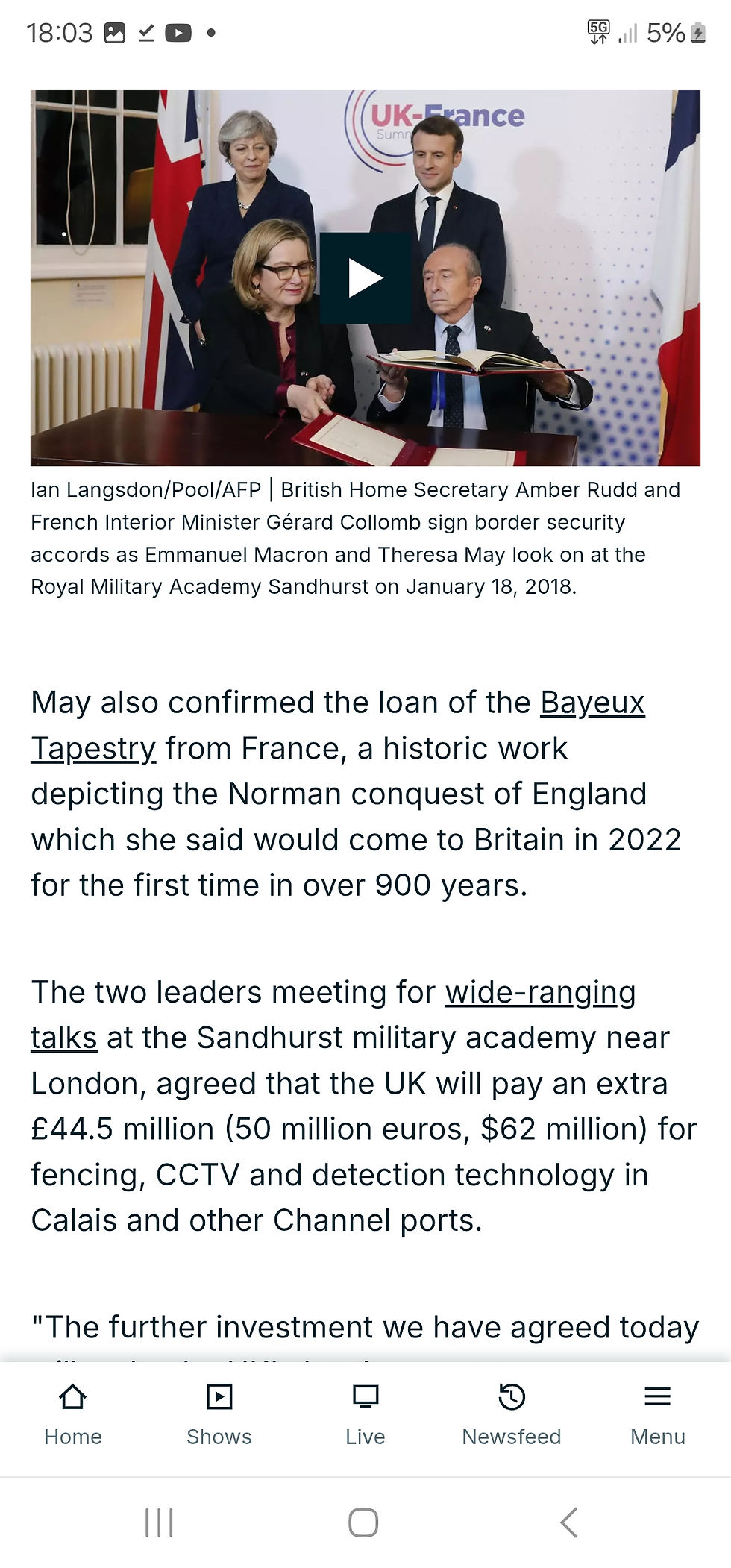
'Sandhurst Treaty': Britain and France agree new deal on border security
Link
⬇️⬇️⬇️⬇️⬇️⬇️⬇️⬇️⬇️⬇️⬇️⬇️⬇️⬇️⬇️⬇️⬇️⬇️⬇️
Part of May's speech


And Macron response includes:

Let me just repeat a pertinent comment here made.
This treaty will allow us to drastically reduce waiting time for all of those who want to cross the Channel from six months to 30 days for adults and from 6 months to 25 days for unaccompanied minors. It’s about our joint capacity to deal with the issue of unaccompanied minors who have family in the UK, and this will be a major element of this treaty: allowing for a more humane but also a more efficient procedure.
So the Treaty is speeding the transfer of people across the Channel?
What does AI say about the Sandhurst Treaty?
AI Overview
+3
The Sandhurst Treaty, officially the UK-France Treaty on Reinforcement of Cooperation for the Coordinated Management of their Shared Border, is a bilateral agreement signed in January 2018 by the UK and France to enhance cooperation on border security and migration issues, particularly concerning the Channel and illegal migration. It builds upon previous agreements like the Le Touquet Treaty and focuses on a "whole-of-route" approach, including addressing migration in source and transit countries.
WHOLE-OF-ROUTE APPROACH 🙃🙃🙃
AI SYNOPSIS OF SANDHURST TREATY
Here's a more detailed breakdown:
Key Aspects of the Sandhurst Treaty:
Enhanced Cooperation:
The treaty aims to strengthen collaboration between the UK and France on border security and migration management.
"Whole-of-Route" Approach:
It recognizes that tackling illegal migration requires addressing issues not only at the border but also in countries of origin and transit.
Specific Areas of Focus:
The treaty includes provisions for:
Combating organized crime groups involved in illegal migration.
Preventing migrants from crossing the English Channel, including measures to stop people hiding in vehicles.
Improving security at border locations and ports.
Strengthening the identification, prosecution, and dismantling of criminal networks involved in illegal migration.
Cooperation on asylum claims and the return of individuals with no right to be in Europe.
Funding and Resources:
The UK has pledged financial support to France to implement the treaty's objectives, including measures to enhance border security.
Joint Coordination Centre:
A joint UK-France coordination center in Calais was established as part of the treaty to facilitate information sharing and joint operations.
Ongoing Cooperation:
The treaty emphasizes the importance of continued collaboration between the UK and France on border security, even after Brexit, according to the UK Parliament.
Juxtaposed Controls:
The treaty builds on previous agreements like the Le Touquet Treaty, which established juxtaposed controls at ports and the Channel Tunnel, according to the UK Parliament.
The Following screenshot has been taken from the UK Government's website where the policy paper states UK - France Summit 2018


One of the documents
⬇️⬇️⬇️⬇️⬇️⬇️⬇️⬇️⬇️⬇️⬇️⬇️⬇️⬇️
SECURITY AND DEFENCE
1. The United Kingdom and France are Europe’s two leading defence powers,
with independent nuclear deterrents, full spectrum armed forces able to
deploy and operate, alone or with Allies and partners, across the world on
land, at sea, in the air, and increasingly today in cyberspace. We both sustain
important defence industrial capabilities essential to Europe’s defence and
security. We have consistently shown both the will and ability to promote and
defend our interests, and support global peace and stability and the Rules
Based International System. Both nations have shown national resilience in the face of recent terrorist attacks – the enduring threats we face are the same and will be so in the coming years.
2. This common purpose and capability is at the heart of the 2010 Lancaster
House Treaties. And it is not new. Later this spring we mark the centenary of
the first placement of both our armies under a single command, with Marshal
Foch’s appointment in 1918 as Supreme Commander of the Allied Armies in
France.
3. Today, following the successful implementation of the measures announced at the Lancaster House Summit in 2010 and at subsequent Summits, our Armed Forces have reached an unprecedented level of integration. Since the last Summit, at Amiens in March 2016, our Armed Forces have been working increasingly closely together. This has included:
• Strengthened maritime cooperation in the Channel and the Atlantic,
including French Atlantique 2 maritime patrol aircraft periodically operating
from RAF Lossiemouth in Scotland, and the closer integration of our national
air defence forces, in response to increased security challenges
• During 2017, a French Armoured Infantry Company forming part of the UK- led NATO enhanced Forward Presence Battle Group in Estonia;
• Working closely together as leading members of the international coalition
against Daesh in Syria and Northern Iraq, including provision of ISR and air-
to-air refuelling. British and French fast-jet pilots serving as exchange officers
have flown on combat missions;
• Supporting each other in providing humanitarian relief in the Caribbean
following Hurricane Irma, including the UK providing a C17 to fly French
emergency supplies into theatre and the French providing imagery intelligence
to the UK;
• Our Navies operating increasingly closely around the world, including: RN
ships acting as escorts to the Charles de Gaulle and French Navy ships to
HMS Ocean in the Arabian Gulf; joint command of Coalition Task Force 150
in 2017 providing maritime security in the Southern Red Sea, Arabian Sea and
off the Horn of Africa; the launch of improved maritime notification arrangements to improve the security of merchant shipping in the Gulf of
Guinea; and UK helicopters deploying to the Indian Ocean and Far East in
2017 as part of the French Jeanne d’Arc task force;
• The appointment of British and French Brigadiers as deputy commanders of
1(FR) Division in Besançon, and 1(UK) Division in York respectively,
including a period when Brigadier Hervé Bizeul served as acting commander
of 1(UK) Division; and
• The UK providing continuing Strategic Transport flights in support to
French operations in Africa.
4. We also delivered full validation of the Combined Joint Expeditionary
Force (CJEF) concept in 2016 following the bilateral Exercise Griffin Strike
in the UK, involving over 5,000 UK and French military personnel. Since
then the CJEF has been available for operations up to Peace Enforcement
should that be necessary.
5. In the capabilities area, we largely completed feasibility work on the Future
Combat Air System project; made significant progress under the One
Complex Weapon programme, including the first successful test firings in
2017 of the Sea Venom/ANL anti-ship missile project announced at the 2014
Brize Norton Summit, launch of the concept phase for the Future Cruise/Anti-
Ship Weapon in March 2017, and signature, ratification and entry into force
of the Inter-Governmental Agreement on complex weapons enabling MBDA
to establish centres of excellence in France and the UK; and launched the
demonstration phase of our joint Maritime Mine Counter-Measures project.
6. In this context, we have agreed on the continuing importance of United
Kingdom defence to the stability of the multilateral order including its
contribution to European defence and security, and of the ability of UK
defence industry to continue to be able to engage in European defence
research and capability development programmes under arrangements to be
defined at the European level and in other relevant formats.
7. Building on these developments, we are now planning to take forward a
coherent programme of further policy, military and capability cooperation
over the coming years:
• Our new Defence Ministerial Council will meet regularly (envisaged as three
meetings a year) to provide strategic oversight and direction of the bilateral
defence relationship. This will be supported by an enhanced defence policy
dialogue;
• We will achieve Full Operating Capability for the Combined Joint
Expeditionary Force in 2020, supported by a coherent coordinated joint
CJEF exercise programme and wide-ranging specialist engagement. This will
give us the ability to deploy a CJEF across the full range of missions
envisaged at Lancaster House in 2010, up to and including crisis management
operation involving early entry in a potentially hostile territory at range;....
For more please use the link below
⬇️⬇️⬇️⬇️⬇️⬇️⬇️⬇️⬇️⬇️⬇️⬇️⬇️
Security_and_Defence.pdf
💩💩💩💩💩💩💩💩💩💩💩💩💩💩
WHAT DISCUSSIONS TOOK PLACE IN PARLIAMENT?
6th December 2018, the following comments were made in UK Parliament:
Written Answers - Ministry of Defence: EU Defence Policy (6 Dec 2018)
Mark Lancaster: The UK has not joined Permanent Structured Cooperation
(PESCO), but recognises its potential to support increased defence
investment in Europe and the development of capabilities that contribute to NATO. The Government is scrutinising the current list of PESCO
projects to identify which of those we might have an interest in, or be
able to add value to, as a third country. Our future...



Marrakesh Compact
CORRESPONDENCE ISSUED TO MPs yet again after this document had been released:

We, the Heads of State and Government and High Representatives, meeting in Morocco on 10 and 11
December 2018, reaffirming the New York Declaration for Refugees and Migrants and determined to
make an important contribution to enhanced cooperation on international migration in all its dimensions,
have adopted this Global Compact for Safe, Orderly and Regular Migration:
19th June 2018

10/11th December 2018 - Marrakesh Compact
Firstly there was an epetition ahead of the event



Government responded:
The Global Compact for Migration will support global co-operation on migration without affecting the sovereignty of all countries to control their own borders.
Uncontrolled migration erodes public confidence, damages economies, and places those on the move in situations of intense vulnerability. The UK is taking significant steps to tackle uncontrolled migration by:- Addressing the root causes of migration, through our targeted assistance for livelihoods, healthcare, education and economic development - Tackling modern slavery and organised immigration crime - Supporting enhanced border management - Providing critical humanitarian support and protection for vulnerable migrants, as well as offering voluntary return and vital reintegration support to those wishing to return home - Supporting refugees to stay in a first safe country through our humanitarian and development work in Africa, the Middle East and Asia.
The Global Compact for Migration embeds these efforts within the global system, enhances cooperation between states, and sets out ways that countries may choose to deliver these objectives.The Compact is not legally binding. It creates a framework to allow countries to work together to make global migration more beneficial for everyone.It respects the sovereignty of all states to decide who enters their territory. It will not affect our ability to determine and implement our own migration policies, including in areas such as asylum, border controls and returns of illegal migrants.It does not establish a ‘human right to migrate’ or create any new legal categories of migrant. It explicitly stresses that migrants are entitled to the same universal human rights as any human being, and that these are different to the legal protections available to refugees.Too many people, including vulnerable women and girls, are taking risky journeys to migrate through dangerous channels. The Compact will help us take important steps to keep migrants around the world safer and to protect the most vulnerable, by supporting international cooperation on the protection of migrants, in line with our obligations under international law. It outlines ways of preventing exploitation, and of combating the heinous crime of modern slavery.A key objective of the document is to support cooperation on reducing uncontrolled migration. It sets out the responsibility of countries of origin to ensure effective control of their borders, and to cooperate in accepting the return of their nationals when they no longer have the right to remain in another country. Furthermore, the text also calls on countries of origin to work with the international community to address the drivers of irregular migration, by creating economic opportunities for populations in source countries, and improving governance and respect for the rule of law.When migration is safe and regular, it can bring great prosperity. The Compact also sets out possible actions to harness the economic benefits of safer, regular migration, for example by reducing the costs of remittances that migrants send home. These can foster economic development in source countries, helping to address some of the causes of migration.The Compact is the result of months of intergovernmental negotiations. Though it is legally non-binding and no country can be compelled to conform with its provisions, we are aware that a small number of countries have chosen not to endorse it. We respect this choice and note that countries will be able to endorse the Compact, or cooperate with other states on delivering its objectives, at any point in the future.Department for International Development


AI Overview
The "Marrakesh Compact" is a common name for the Global Compact for Safe, Orderly and Regular Migration (GCM), an intergovernmentally negotiated agreement adopted in Marrakesh, Morocco in December 2018. It's a non-binding framework that aims to foster international cooperation on migration, promoting safe, orderly, and regular migration while addressing its challenges.
Here's a more detailed explanation:
Purpose:
The GCM aims to facilitate international cooperation on migration, aiming to make migration safer, more orderly, and more regular. It also seeks to reduce the negative impacts of irregular migration and to protect migrants' rights.
Non-binding nature:
The GCM is not legally binding, meaning countries are not obligated to follow its guidelines.
Key principles:
The GCM is based on international human rights law and reaffirms the commitment of states to respect, protect, and fulfill the human rights of all migrants. It also emphasizes the importance of partnerships with non-state actors, such as civil society organizations.
Objectives:
The GCM outlines 23 objectives covering various aspects of migration, including:
Data collection and analysis: Improving data on migration to better understand its patterns and trends.
Safe and orderly pathways: Enhancing pathways for regular migration, including skilled worker programs.
Protection of migrants: Addressing the vulnerabilities of migrants at different stages of their journey.
Cooperation and partnerships: Fostering cooperation between states and other actors to manage migration effectively.
Implementation:
The GCM is being implemented at the national, regional, and international levels. The Refugee Law Initiative Blog has a series of blogs examining its implementation, including regional reviews.
Criticism and controversy:
The GCM has faced criticism and controversy, with some arguing that it undermines national sovereignty and could encourage illegal migration. However, proponents argue that it provides a framework for managing migration responsibly and ethically.
EPETITION






Several national leaders, EU and UN officials have made statements rejecting the claims made about it, stressing that the GCM is not legally binding, and does not include text making migration a human right or criminalising criticism of migration.
Adoption of the Compact
The GCM was adopted by acclamation by the representatives of 164 governments at the intergovernmental conference in Marrakech on 10 December 2018. It was also agreed that the GCM would hitherto be known as the Marrakech Compact.
At the conference the UN Secretary-General António Guterres referred to the “many falsehoods” uttered about the Compact. UN Special Representative for International Migration Louise Arbour said that that the Compact “reinforces, unambiguously, the fundamental principle that migrants everywhere should be treated with dignity and fairness”. She stressed however that the GCM does not create any new right to migrate, and that “it is not correct” to suggest the GCM imposes obligations on Member States and infringes on their sovereignty”. She said it did “nothing of the sort” and “is not binding, as a treaty would be”.
The UN General Assembly officially adopted the GCM in a vote on 19 December. There were 152 votes in favour, with five countries voting against and twelve abstaining. The countries voting against were: Hungary, Poland, the USA, the Czech Republic and Israel. The countries abstaining were: Algeria, Australia, Austria, Bulgaria, Chile, Italy, Latvia, Libya, Liechtenstein, Romania, Singapore and Switzerland.
Brazil was among the countries voting in favour of the GCM. However, after taking office in January 2019, the new Brazilian President Jair Bolsonaro said that Brazil would no longer be party to the Compact.
TIMELINE CONTINUED
🇫🇷 🇪🇸 🇵🇹 🇩🇪 🇫🇷 🇪🇸 🇵🇹 🇩🇪
20th September 2019
Brexit raises questions for EU defence integration
Ahead of a new institutional cycle beginning in November, the European Commission and the EU-27 are reflecting upon the future global role of the EU, particularly its ability to act independently in the world.
Brexit has raised many questions about the EU's approach towards security and defence, especially its perception of
the role that the UK, a major military actor on the continent, would play after it leaves the EU.
At the moment Brussels expects to engage with London on the same basis as with other third countries.
However, given its capabilities in this area, it is not unreasonable for the UK to expect a role proportional to its
security contributions, and without these contributions the EU's plans for 'strategic autonomy' are unlikely to be
credible.
Since the 2016 referendum (and perhaps as a consequence
of the result), the EU has shown interest in greater
integration in this area, which the UK often blocked with its
veto.
In 2017, the Permanent Structured Cooperation (PESCO) was launched, with the goal to develop joint military
capabilities and operational capacity.
The European Defence Fund (EDF), proposed by the Commission to help member states coordinate their
defence spending, is due to be granted approximately €13bn from the next long-term budget (Multi-Annual
Financial Framework, MFF).
While it is an exaggeration to speak of an 'European army', in recent years there has been an increased movement
towards further integration on defence.
Incoming Commission president Ursula von der Leyen has made "an integrated and comprehensive approach to
[European] security" a priority of her programme, while suggesting strengthening institutions such as the European Defence Fund (EDF) and using qualified majority voting (QMV) in foreign policy.
Space frontier
The new Commission will also include a new directorate - general for defence industry and space, responsible for an "open and competitive European defence equipment market" and implementing space programmes.French president Emmanuel Macron, who recently
displayed his ambitions to be Europe's leading diplomat, has also been calling for a stronger role for the EU on the
international stage.
In his call for European renewal, he argued for a treaty on defence and security, increased spending and setting up a new institution, the European Security Council, for more effective decision-making.
Macron has stated multiple times that reinforcing European defence integration was a priority for his government, while also reiterating his commitment to cooperation with the trans-Atlantic alliance.
After the G7 in August, Macron hosted ambassadors based in France and made a speech about the importance of
building 'European sovereignty' in the wake of global changes, warning that Europe could become a minor
actor in world dominated by the US and China.
Part of building this European autonomy, according to Macron, is to be "sovereign in the sphere of defence," and
he pointed out that this cannot be built without the UK's participation.
Minus the UK
But neither the commission nor the 27 capitals have set out in detail their vision for future coordination and cooperation with the UK after it is no longer part of EU institutions.
The UK is one of the two major military players on the European continent, and as Macron recognised, without its
involvement, European defence initiatives are unlikely to be credible enough to match the ambition of developing a
more autonomous defence policy.
The European Court of Auditors pointed out that the EU's planned increase in defence spending would not
compensate for the gap created by the UK's withdrawal, and there would be a "mismatch" between resources and
ambitions of European 'strategic autonomy'.
Although British contributions to the EU's Common Security and Defence Policy (CSDP) missions have not been
significant, after Brexit the UK's strategic interests on the European continent will not change radically, and both
Theresa MAY and BORIS Johnson have stated their intentions to remain COMITTED to European security.
For future arrangements, much will depend on the political ambitions and level of trust between both sides, whatever the outcome of Brexit.
Even in a no-deal scenario, the UK could be willing to contribute and participate in operations that are in its strategic interests, notably those in the EU's neighbourhood.
The EU seems keen to welcome the contribution of UK assets for its objectives, but at the same time it is not prepare to go further than current arrangements with third parties for defence cooperation.
It is not clear yet how countries outside the EU could engage with PESCO, for instance, but they are unlikely to
get any influential role.
Brussels' current vision for cooperation on defence, where third countries can contribute but have no say in decision-
making and in the guidance of operations, is unlikely to be
attractive to the UK.
Most of the defence sphere is not about the EU framework
– the Commission itself admits that NATO will remain the cornerstone of European security, and the alliance with the US will likely remain the UK's preferred choice.
Cooperation could also continue via bilateral agreements, notably the defence treaty with France, as well as the new European Intervention Initiative (EII) set up by Macron, of which the UK is already a member.
Overall, both sides have a number of questions to answer about their future security and defence relations.
The UK will have to develop a policy towards the EU's integration initiatives (whatever path these take), and to
set out its preferred formats for future dialogue.
Meanwhile, the EU appears to have given little thought about how to cooperate with the UK on a joint basis, rather
than sticking to its previous formats of cooperation.
Taken from
⬇️⬇️⬇️⬇️⬇️⬇️⬇️⬇️⬇️⬇️⬇️⬇️
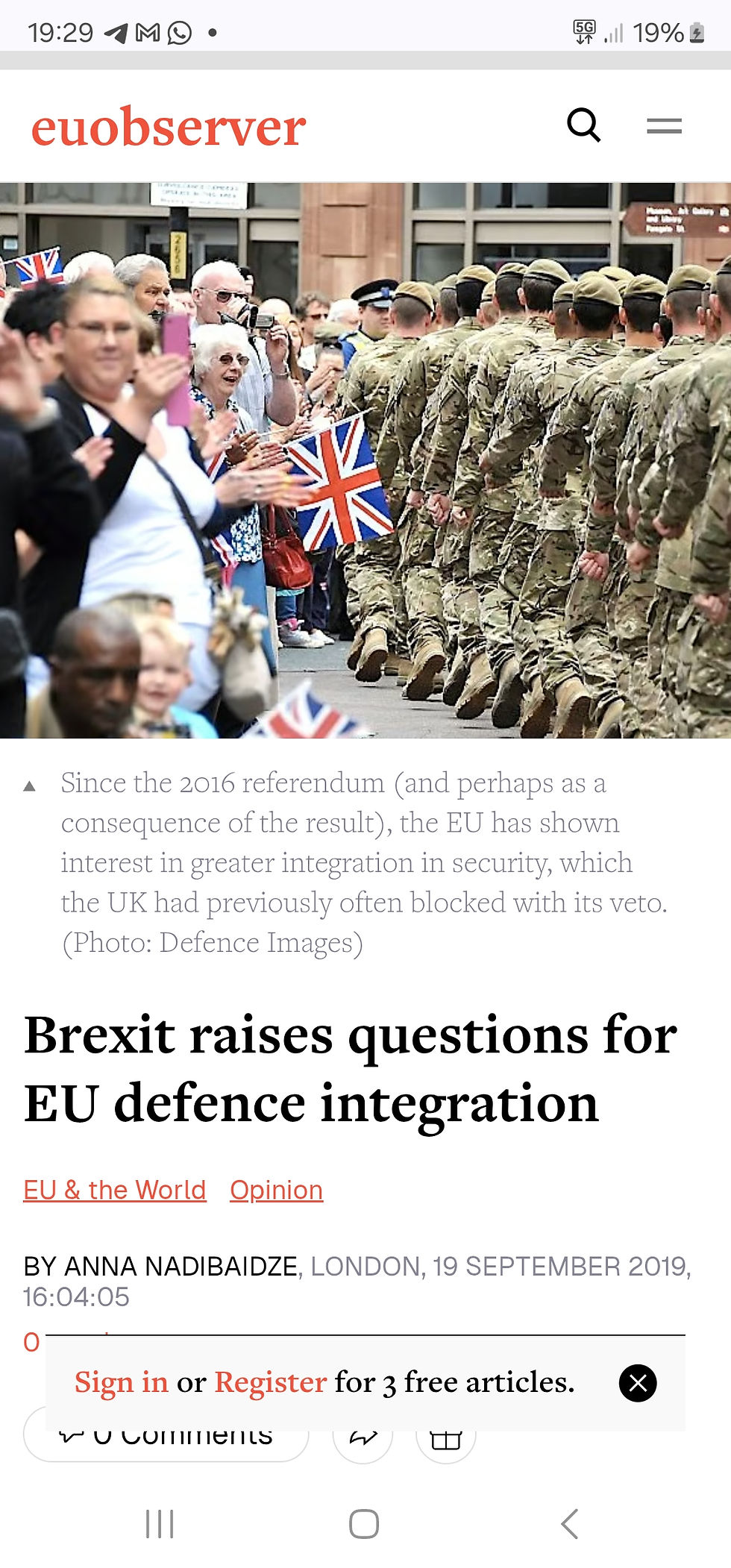
😏😏😏😏😏😏😏😏😏😏😏😏😏😏😏
🦄🦄🦄🦄🦄🦄🦄🦄🦄🦄🦄🦄🦄🦄🦄
But what is the real truth in 2025?
Please keep revisiting this page. It is a Work in Progress. 💯
It does appear that the Military Complex and 'Migration Watch' seem to be inextricably linked.

Please also ensure that everyone is informed. The future, your future....



Comments